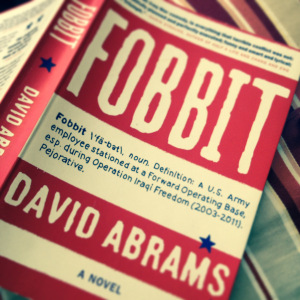Are there 16-year-olds who don’t think Catch-22 is awesome? What about The Things They Carried? Or Slaughterhouse Five? To a certain type of pre-intellectual kid, these tongue-in-cheek, what-does-it-all-mean, to-hell-with-authority, don’t-trust-anyone-over-35 novels are a rite of passage. I was no exception, and I bet you weren’t either.
Truth be told, I haven’t really read a novel in which a war was the centerpiece of the narrative in about ten years. It makes me nervous, it makes me sad. I avoid it. I have no stomach for violence. I vomited while reading Bury My Heart at Wounded Knee, and thus have avoided this particular genre for the most part. I wouldn’t have picked this up at all if it weren’t at the urging of one of my friends, and I’m glad I took her advice. Fobbit was another quick-but-significant read, and it’s in the same vein of the aforementioned novels. If you like that, you’re in the right place. Be forewarned, if you aren’t already, that this isn’t a shoot-em-up, glory days memoir, but something that feels at once worse and better than that. Stories like No Easy Day, while less fun to read, feel better because they can make you believe in the moral rectitude of war. There’s room for that, for sure, but there’s a place at the table for Fobbit, too.
Fobbit tells the story of the trials and tribulations of several soldiers at Forward Operating Base Triumph in the middle of the war in Iraq. In the alphabet soup that is the military jargon, FOB is the abbreviation for Forward Operating Base, and “fobbit” is the name for the soldiers who work “inside the wire”, which is to say they stay on the FOB rather than going out to the very front. In years past (say Korea or Vietnam), the rear was pretty safe (think M.A.S.H.), but now, they occupy a weird liminal space where they’re not really safe at all, but they’re not likely to actively engage in firefight or eat M.R.E.s. That’s what this book is about. The folks Abrams covers range from the fobbitiest of fobbits to bona fide tough guys, and it follows in the tradition of Heller, O’Brien, and Vonnegut: no one’s a hero, no one’s a winner, there are only plots on a continuum of gray. David Abrams is an insider’s insider, and he brings humor, wit, and intellect to a war narrative.
The primary characters we get to know over the course of Fobbit are Staff Sergeant Gooding, Captain Shrinkle, Lieutenant Colonel Duret, and Lieutenant Colonel Eustace Harkleroad. I have the dubious privilege of knowing a lot of soldiers who have fought in the Iraq and Afghan conflicts over the last decade, and you can be damn sure I recognized them all. You’ve got CPT Shrinkle, a guy who has somehow been allowed outside the wire and given decision-making capacity. There’s LTC Duret, a steely-eyed, hard-bellied professional with nothing but contempt for the pasty dudes hanging out at Triumph. LTC Harkleroad is the contemporary equivalent of your great uncle who claims to have Hitler’s piano key in his bureau but was secretly a translator who came in after the fact to clean up. Then there’s SSG Gooding, who is the closest thing we’ve got to a hero. He’s smarter than your average bear, and he manages outgoing messages to the American press. Gooding’s never going to see a moment on the honest-to-God front, and he’s smart enough to know that’s not necessarily the worst fate he could have, though he understands that those guys know something he doesn’t. Even the minor characters I met in passing were men and women I’d encountered before.Abrams tells their tales chapter by chapter; some of the best parts are when you get to look at the same event through the eyes of several different people, all of whom see things very differently indeed. He does a spectacular job capturing their voices- the jargon, the off-color jokes, the slapstickishness. I’m sure his twenty years in the army helped him to fine tune this, though sometimes it goes a step further than I’d like, and it makes the dialogue sound a little stilted to the civilian ear.
Fobbit is the kind of book that can make you feel feels, as the kids say. I hated Eustace Harkleroad and Abe Shrinkle and the others who were like them in a way that I thought was almost undignified. The obsession with creating the Army Story (the former) and having one’s own war story to tell (the latter) made my vision narrow. Even the more throwaway details about them- that they were hoarders, or slovenly, or whatever- made me hate them. When clues came that some of them might not make it back to America, I can’t say I was upset. They were malingerers, the very worst of Uncle Sam’s Finest. But then I realized that that weird feeling of anger extended to Gooding and his buddies, too. Even though they saw what they were doing and they knew it was wrong, they carried out orders. They were part of the problem, and they extended the problem’s reach. About 200 pages in, I realized I was just angry at the whole concept of war and the army and was having the feelings I had when I read about the soldiers in The Things They Carried shooting the skin off the baby water buffalo. I wanted one of them to do something he couldn’t do: stand up, tell everyone that they were doing something wrong, and then tell the rest of the world what they knew. That’s not ever going to happen, regardless of what war we get into or out of. They weren’t horrible, they were just people responding to horror. Horror makes a fool of us all.
